Interviews March 2018
NEWSLETTER
SPECIAL COVERAGE
Interview with Matthew Difranco
CHAIR
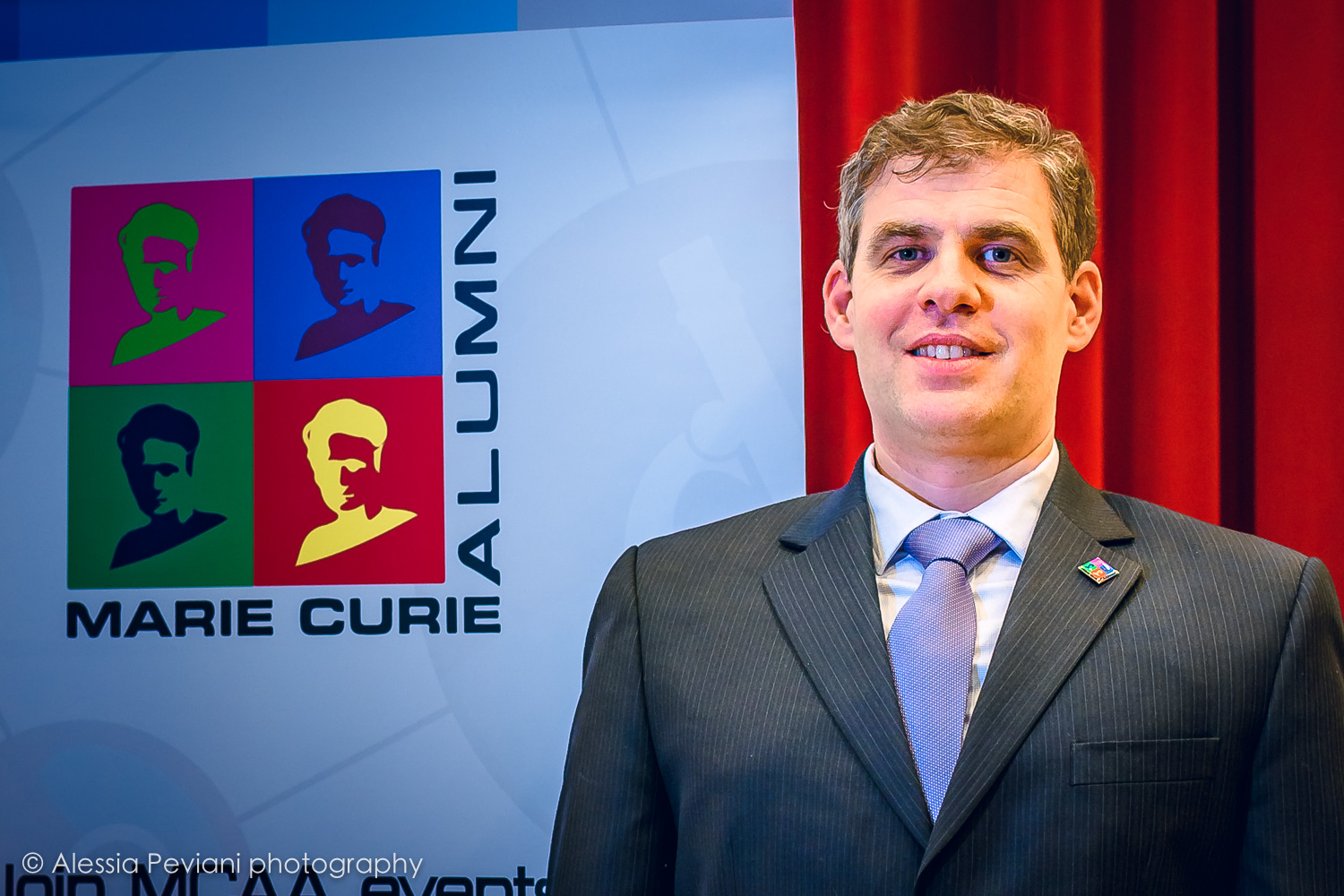
Could you say a few words about yourself?
Born and raised in New Jersey, I did my undergraduate degree in Materials Science and Engineering at Drexel University in Philadelphia, Pennsylvania. After three years as an IT consultant, I moved to London in 2003 with the intention of completing a one-year master’s programme in Computer Science at University College London, and then going back to the US. But then life happened, and after two more years at UCL as a research assistant, I moved to Dublin for a PhD programme in Computer Science at University College Dublin. During my PhD, the economy crashed in Ireland (and pretty much everywhere else). I spent two months in Vienna for a summer school and lab visit in 2008, where I developed a collaboration at the Medical University of Vienna (MUW), which would lead to my application for a Marie Curie Individual Fellowship to move to Vienna. Last year I left my job as a staff scientist at MUW to work independently as a researcher and consultant.
Why did you apply for the Chair position?
I joined the MCAA during my Individual Fellowship in Vienna, and was happy to be part of a network of researchers who shared a common experience. Getting a Marie Curie IF
is prestigious and rewarding, but can also be challenging and lonely, since one is often working on a solitary project in an unfamiliar country. Since I remained in Vienna after my IF, I stayed active with the MCAA Austrian Chapter (MCA3C), eventually becoming Chair. As the 2016 MCAA Board elections in Venice approached, the MCA3C met and discussed getting involved with the MCAA Board to help shape the organisation.
I was elected in Venice to an Ordinary Board position, and since then have spent the last two years learning about what the MCAA does, how it works at the Board level, and developing ideas for the future of the organisation. When it was clear that our former Chair, Brian Cahill, would not run again for Chair in 2018, I was encouraged by a number of Board members to run for Chair. I decided to run, but I wanted to work with people who already had some experience in MCAA, who had complementary skills and concrete ideas of what they wanted to accomplish and who could work well together as a team. My goal was to bring more structure to the governance of MCAA and to focus on securing a future for the Association for years to come.
What are your priorities for the MCAA for the coming two years?
Well, since we ran as a team in the Board election, and since all 11 of us managed to win a position, the question is really, what are ‘our’ priorities? First, we want to bring more structure and organisation to the management of the MCAA, so that future Boards can pick up from the one before them. We don’t want the MCAA to live and die based on the dedication of a few people, but rather thrive based on the contributions of many, and the processes we hope to put in place. We also want to develop the reputation of MCAA as a strong voice for researchers and research policy at the European level, as well as in individual countries. We want to secure the financial stability of the MCAA through sponsorships, partnerships, further revenue-generating projects such as books and training events, and grant funding for various projects where the MCAA can take part. And finally, we want to continue offering networking and career development opportunities to our members through our Chapters and Working Groups.
Could you share your impressions from the General Assembly?
I was very happy to see that the GA grew in terms of participants, sessions, and exhibitors. Leuven was a great location, being a small city, but close to Brussels. There were a lot of people participating for the first time, and I heard a lot of positive feedback about the sessions which were run during the Annual Conference. I was also pleased to see that the GA Task Force for 2019 in Vienna was present and actively engaging with participants and organisers to begin planning for next year. The MCAA Annual Conference and GA should be the most important event for us each year, and I hope we can make the experience in Vienna even better than it was in Leuven.

SPECIAL COVERAGE
Interview with Mostafa Moonir Shawrav
VICE-CHAIR
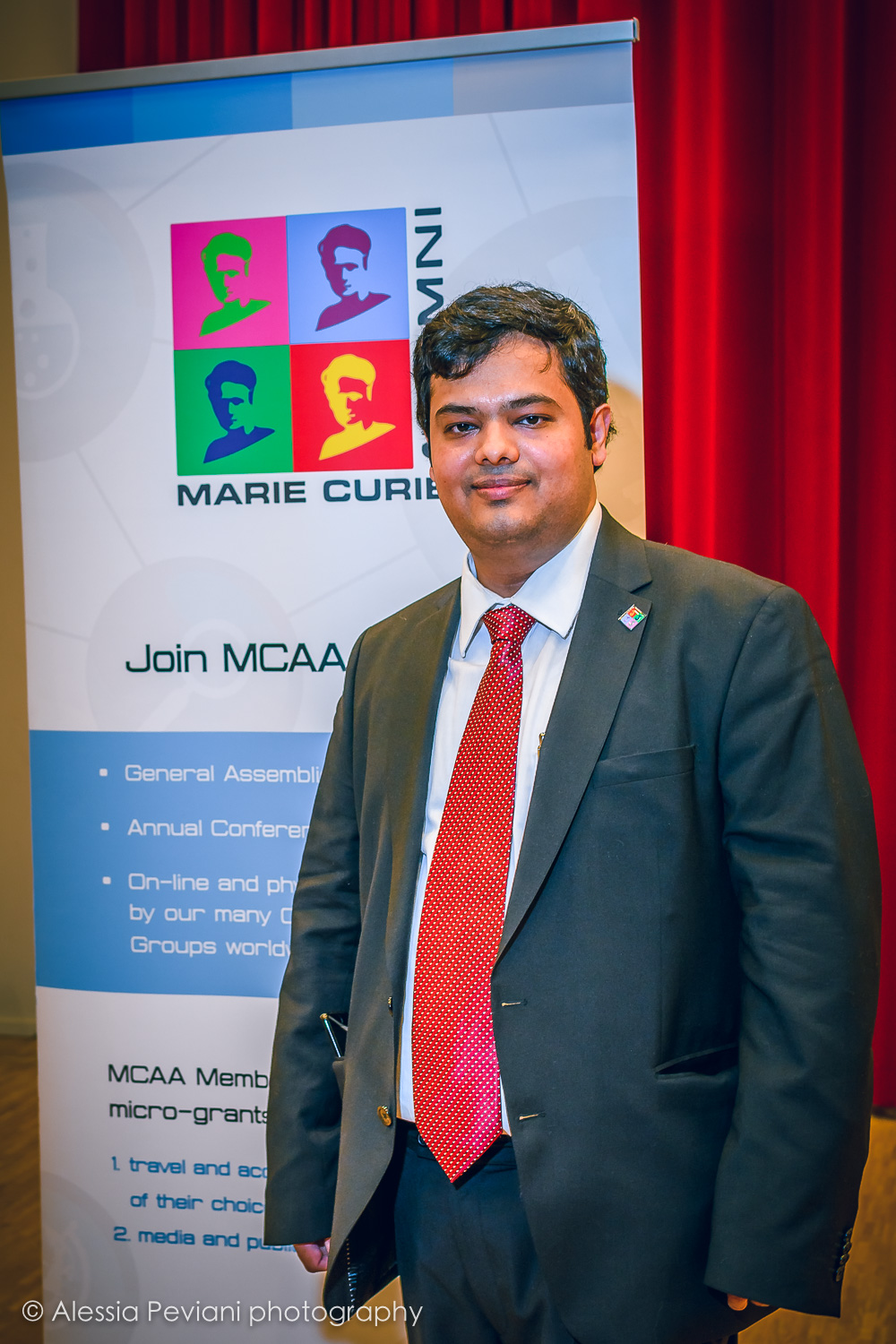
Could you say a few words about yourself?
I am, currently, a Post-Doctoral researcher working on a European Research Council-funded project at Vienna University of Technology, Austria. In 2012, I started as an Early Stage Researcher with the ENHANCE project, a Marie Curie Initial Training Network at the same university. Before Austria, I also worked at the Université Catholique de Louvain, Belgium, and I studied nanotechnology at the University of Twente, the Netherlands. Over the last two years, I have received several awards, including Marie Curie Alumni of the Year 2014 from the MCAA, the first award of its kind, and the Young Scientist Award from the European Materials Research Society. I am a Fellow of Royal Microscopical Society. I was born and brought up in Bangladesh, a country in south-Asia, which has the world's longest sandy sea beach and the largest mangrove forest. I began my education in Bangladesh and graduated as an Electronics Engineer. I believe that my networking skills and enthusiasm for encouraging MCAA members to evolve and develop together and influence one another come from the Bangladeshi culture of hospitality and empathy. The eastern philosophy of sacrifice, symbiosis and love for nature guides my philosophy of science, which is to help human civilisation through nanotechnology.
Why did you apply for the position of Vice-Chair?
I have been an active member of the MCAA since its establishment. I founded the Austrian Chapter of MCAA with my colleagues and went on to make it an active Chapters. Later on, I joined the Financial Affairs Working Group to bring in sponsors and funding. Before getting elected as Vice-Chair, I was chairing the Austrian Chapter and contributing as an ex-official Board member. So, running for the vice chair position was a natural progression and in tune with my mission and vision for this organisation that is so dear to me. I was also encouraged by Fellow members, such as Matthew Di- Franco. Over the last few years, as an association, we have started to contribute to a number of different areas. The outgoing Board members Brian, Marco and Kiran did an outstanding job and gave a lot of exposure to the MCAA. Following in their footsteps, I want to be an integral part of this fantastic organisation in its growth, development and influence. I feel that the time is now right for me to be more directly involved in the MCAA’s decision-making process` and to put into practice my innovative ideas for its evolution. I would like to thank all the members on behalf of the whole Board for selecting us to represent the MCAA.
What are your priorities for the MCAA for the coming two years?
As a very young association, we face many challenges.Other than running this association successfully, I would personally like to focus on: Career Development of members: Members are the core assets of this association. I want to meet the needs of members from different research fields and from different career stages. Very specifically, we would like to offer more career development- related courses that are needs-based and result-oriented, and with a holistic approach. The ideal situation would be to have a set career path with short and longterm goals where members are actively guided and trained by inhouse and external experts.
Incubator:
My ultimate dream is to obtain a place for MCAA members in each incubator in Europe. Recently, I established a collaboration with the Innovation Incubation Centre (i2c) in Austria, which is providing training to selected members.
Special groups:
I would also like to form a subgroup for less-represented groups in our
association. For example, I want to establish and institutionalise a support system for differently abled researchers (I do not like the terminology ‘physically and mentally challenged or disabled’ as we all are challenged or disabled at some point in life).
Female focus:
Our association is named after one of the greatest women scientists, who is also my role model. Career support for women scientists is increasing, but we still have a long way to go. We already have a Working Group for women, but I feel we should be more vocal on policy level changes for women scientists.
Financial sustainability:
I would also like to contribute to the self-sustainability of the MCAA. As a member of the Financial Affairs WG and in my capacity as a Chair of the Austrian Chapter, I have already showed how we can generate funds to offer workshops/career- related services. Over the next two years, I would like to make a concrete plan for fundraising activities. Just to give you one example, we are making new web pages for each Working Group/Chapter. This will help them find their own local partners and sponsors. Personally, I would also like to bring synergy and coherency between various thematic Working Groups and geographical Chapters. I hope that together with my Fellow Board members, I will be able to achieve these priorities over the next two years.
Could you share your impressions from the General Assembly?
It is very exciting to see the number of attendees at our General Assembly increasing every time. This year, we had some great sessions on very popular topics such as career development and science communication. Interestingly, we also discussed unconventional but necessary topics, such as researchers’ mental health, support opportunities for differently abled researchers etc. I personally greatly appreciated the enthusiasm among the members, especially those attending for the first time. Though it was late at night, I enjoyed the Science Slam immensely. Overall, it was a nice experience, thanks to Bala, the organisers and the contractors, who worked hard. As the organising chair of the next General Assembly, I would like to invite all our members to come to Vienna on 24 and 25 February 2019, and I hope to create a very memorable and helpful experience for them.
SPECIAL COVERAGE
Interview with Valentina Ferro
VICE-CHAIR
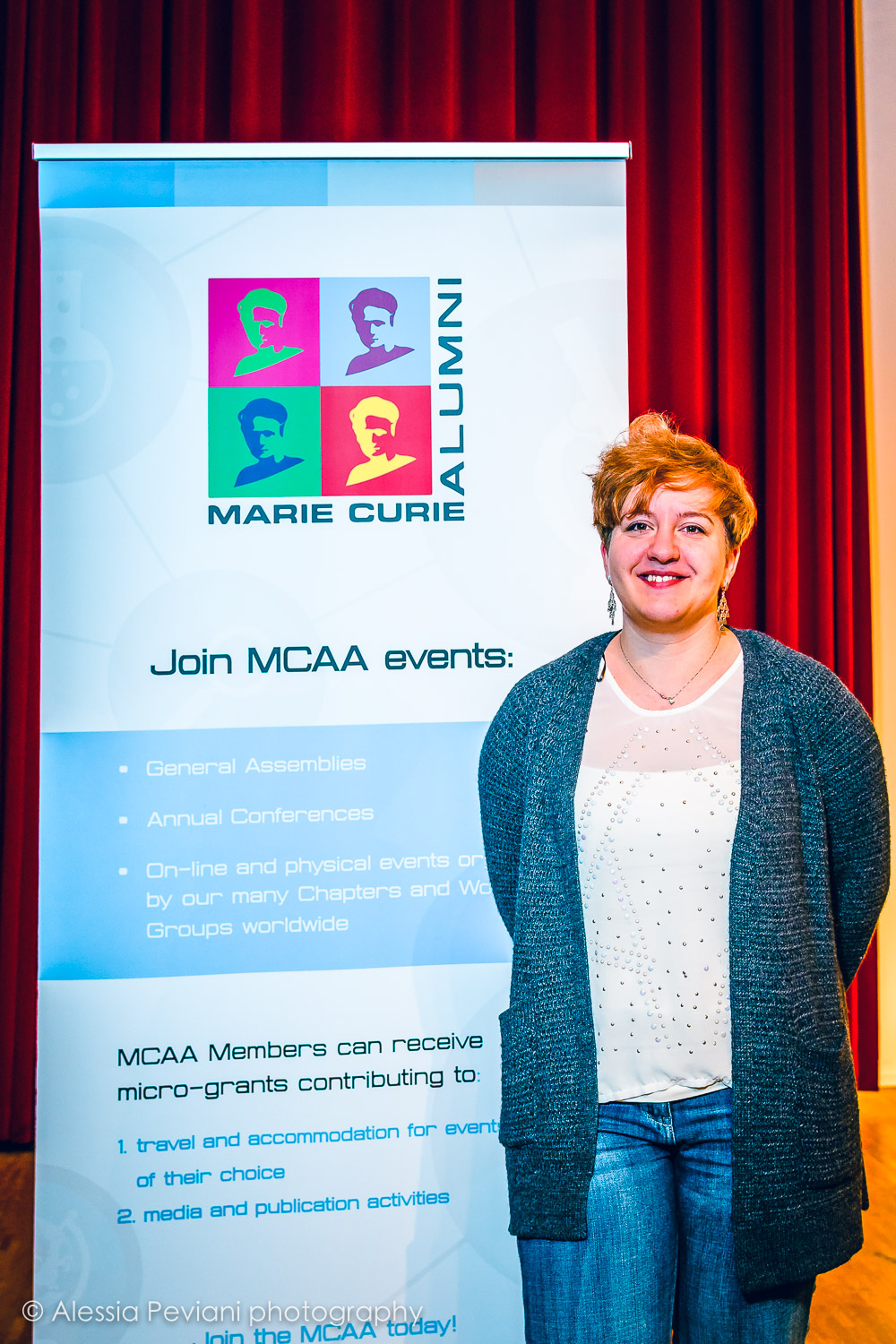
Could you say a few words about yourself?
Passionate about science and enthusiast about sharing it. I have just completed my Marie Curie Fellowship in the ITN Phoqus, where I worked as a PhD student in the field of biophysics, and specifically optical tweezers. I have lived in four different countries, counting Italy, where I was born, and I received both my BSc and MSc in Physics from the University of Catania. From there, I moved to Belgium, then Scotland, and sometime along the way I lived in Germany too. Travelling and meeting new people and cultures are two of the things I love the most about being a researcher. This is probably why, once I started being part of the MCAA, I never stopped contributing to it.
Why did you apply for the Vice-Chair position?
Over the last two years, I have been increasingly involved in the activities of the MCAA. It started with founding the Scotland chapter and organising its activities, but the more I have got to know the association the more I wanted to contribute, participating in the Board meetings, volunteering with the newly established blog and helping in every way I could. At my first GA, Salamanca 2017, I felt at home:
• I was surrounded by like-minded people with similar experiences and objectives.
• It was only natural to take my contributions to the next step, applying for the position of Vice-Chair. The group I shared the campaign with, MCAA2020, was all the incentive I needed to make the final decision.
What are your priorities for the MCAA for the coming two
years? The MCAA has grown incredibly and so have expectations on the quality of our activities and partnerships. I believe that reinforcing a sense of belonging for MCAA Members will help to generate more quality content, as more members would genuinely be more active in our community. Improved communication, among the members and with external partners, is one of my priorities as it is, in my opinion, key to achieving this result. Obviously, we will also need to encourage this engagement by marketing the advantages of being a member and providing new and exciting opportunities. Doing this would put a lot on the MCAA's plate, making it of crucial importance that we streamline our procedures, that we increase transparency, that we are able to attract more partners. We need to start rethinking the MCAA as more than ‘just’ an Alumni association. Together with the elected Board we are already brainstorming on these topics and many new ideas are already on their way.
Could you share your impressions from the General Assembly?
The General Assembly 2018 was extremely interesting from different viewpoints. Being a candidate for the Board, I had plenty of excuses for doing what I like doing best: talking to people, getting to know them, but also understanding what we can - and have to — do better. Of course, I also took pride in what we are already doing so well. The content of the parallel sessions is better every year, with more and more interesting speakers. Moreover, I lived in Leuven for a year in the past, and being together with both old friends and new (made over the two days), was priceless. I am looking forward to being a Board Member for the Vienna 2018, and I can assure you that the whole Board has already started working on it, to reproduce the good things from this year and, of course, improve on them to make the event even better.
SPECIAL COVERAGE
Interview with Bala Attili
TREASURER
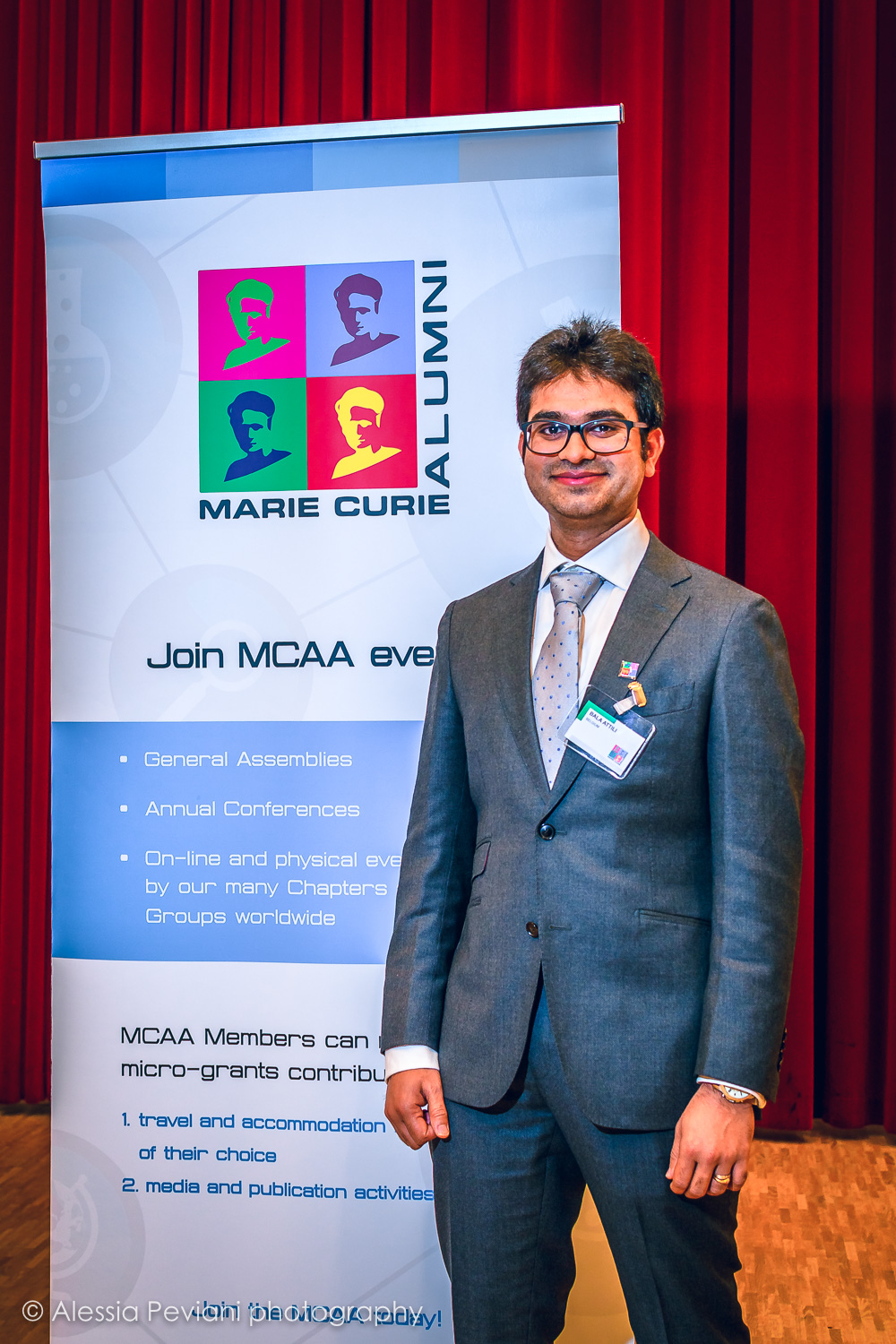
Could you say a few words about yourself?
I am Bala Attili, Ph.D. Researcher in Pharmaceutical Sciences specialised in Pharmaceutical Chemistry at the Department of Pharmaceutical and Pharmacological Sciences of KU Leuven, Belgium. I have been honoured with Marie Curie Fellowships twice (FP7 and Co-fund projects). I have a Master’s degree in pharmacy (MPharm) as well as in Business Administration (MBA specialised in international business). I have more than five years of experience in the workplace, and I’ve worked across Europe. I am currently an MCAA Executive Board Member and Treasurer (as of February 2018). I was previously a Board Member (2016-2018) and also Chair of the BeNeLux chapter (2015- 2016). I contribute to the Financial Affairs working group, and I am also an active volunteer with many NGOs.
Why did you apply for the Treasurer position?
I believe in making the MCAA a I am prepared to invest my previous experience gained as Board Member and as Chair of an MCAA chapter in running the association efficiently. The position of treasurer within the MCAA is crucial. It obviously involves dealing with various budgetary matters, but also planning for the future sustainability. With the skills that I have acquired during the course of my career, I believe I am the ideal person for managing both finances and people, hence my motivation to be treasurer.
What are your priorities for the MCAA for the coming two years?
My vision is to see the MCAA become a global, self-supporting association and a platform for all Marie Curie Fellows to share ideas, discuss and collaborate with each other. I attach particular importance to self-sustainability and transparent budgeting.
Self-sustainability: we should unleash the potential of the MCAA so that it can brand itself as a self-supporting association by 2020. Achieving this would involve various strategies, such as: (i) partnerships with industry and research institutes (ii) organising career fairs and an annual general assembly, (iii) encouraging and training the chapters and working groups to be self-sustaining. Transparent budgeting. The budget allocations should be adjusted based on the chapter and WG activities. The budget and miscellaneous actions should be monitored regularly, and the budget caps revamped (if needed). Budgetary allocations should be flexible (to allow for unforeseen projects).
Could you share your impressions from the General Assembly?
This year GA was a huge success, with more than 400 participants for the GA and AC. We had high-quality talks during our opening, keynote as well as parallel sessions. More than 100 posters were presented by Marie Curie Ph.D. students and Postdocs from various disciplines. A new MCAA board was elected. I was delighted to be elected as an executive committee member, as Treasurer. Overall, this year the GA was a great success and it is absolutely fantastic to see from the increasing number of attendees that more and more active MC Fellows want to stay in touch with the MCAA. See you all @Vienna-2019.

SPECIAL COVERAGE
Interview with Murat Gunes
SECRETARY
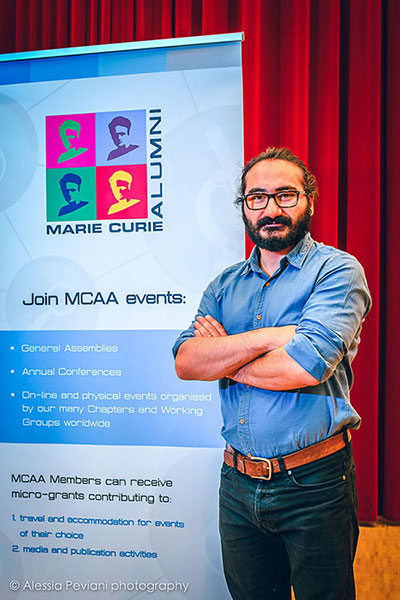
Could you say a few words about yourself?
I am the type of person to meet challenges head-on rather than sweep them under the carpet and hope they go away. While I'm an optimistic person, I am also realistic about the current situation. I am hard working and I consistently sets firm goals for myself. Then, once I've defined the benchmarks, I take the necessary steps to achieve those milestones.
Why did you apply for theposition of Secretary?
I have had experience of scientific collaboration, volunteered in several associations and organised national and international workshops. I put huge emphasis the importance of the skills needed for such activities and makes me want to share my experiences, which I hope will be of benefit for the MCAA.
What are your priorities for the MCAA for the coming two years?
I believe that career development and recognition can be ensured by training, outreach activities and networking:
• Supporting Chapters and Members' activities boosting the revenue of MCAA;
• Increasing the number of outreach activities and their diversity;
• Supporting interaction with the public, industry and schools to increase understanding of scientific activities.
Could you share your impressions from the General Assembly?
It was such an amazing atmosphere with more than 500 attendees. Young scientists were all together to meet and share their experiences. The MCAA Working Group presentations were highly beneficial in terms of career development and self-training.
SPECIAL COVERAGE
Interview with Zsofia Buttel
ORDINARY BOARD MEMBER
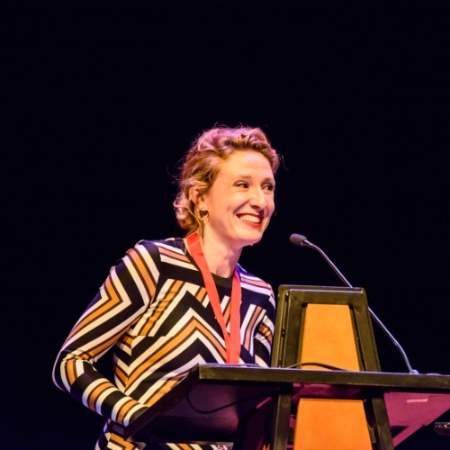
Could you say a few words about yourself?
I am a final year PhD candidate in the Molecular Microbiology Group of the University of Groningen, developing genetic tools for the production of antibiotics in filamentous fungi. I have been very fortunate that as an Early Stage Researcher in an Initial Training Network I have had the opportunity not only to develop my research skills, but also get valuable insights into working with industry. This has been an invaluable experience that has helped me think about my career in a more holistic way. I am also a bit of a networking enthusiast — from the very beginning of my scientific career I have actively involved myself in professional and academic associations. This type of volunteering has offered a range of excellent opportunities for both personal and professional development. What can I say — I love science, I love the buzz of the scientific community and I am super driven to learn, grow and leave a positive mark wherever my career takes me.
Why did you apply for the position of Ordinary Board Member?
I passionately believe that scientists should be far more involved in decision-making and that we are responsible for forming public opinion. This is especially true in today’s challenged world. That sense of taking action is what attracted me to the role. Besides I’m honoured and proud to be supported by the Marie Skłodowska-Curie Actions.
What are your priorities for the MCAA for the coming two years?
As the Chair of the Financial Affairs Working Group for the past months, I have been working on a financial framework to attract and retain sponsorship and thereby secure the financial sustainability of the MCAA. Over the next two years I would like to continue working on this financial plan and the association’s external relations, building industry partnerships and mapping career opportunities for early stage researchers.
A last word for those who elected you?
Thank you for your trust, go science!
SPECIAL COVERAGE
Interview with Maria Gorna
ORDINARY BOARD MEMBER
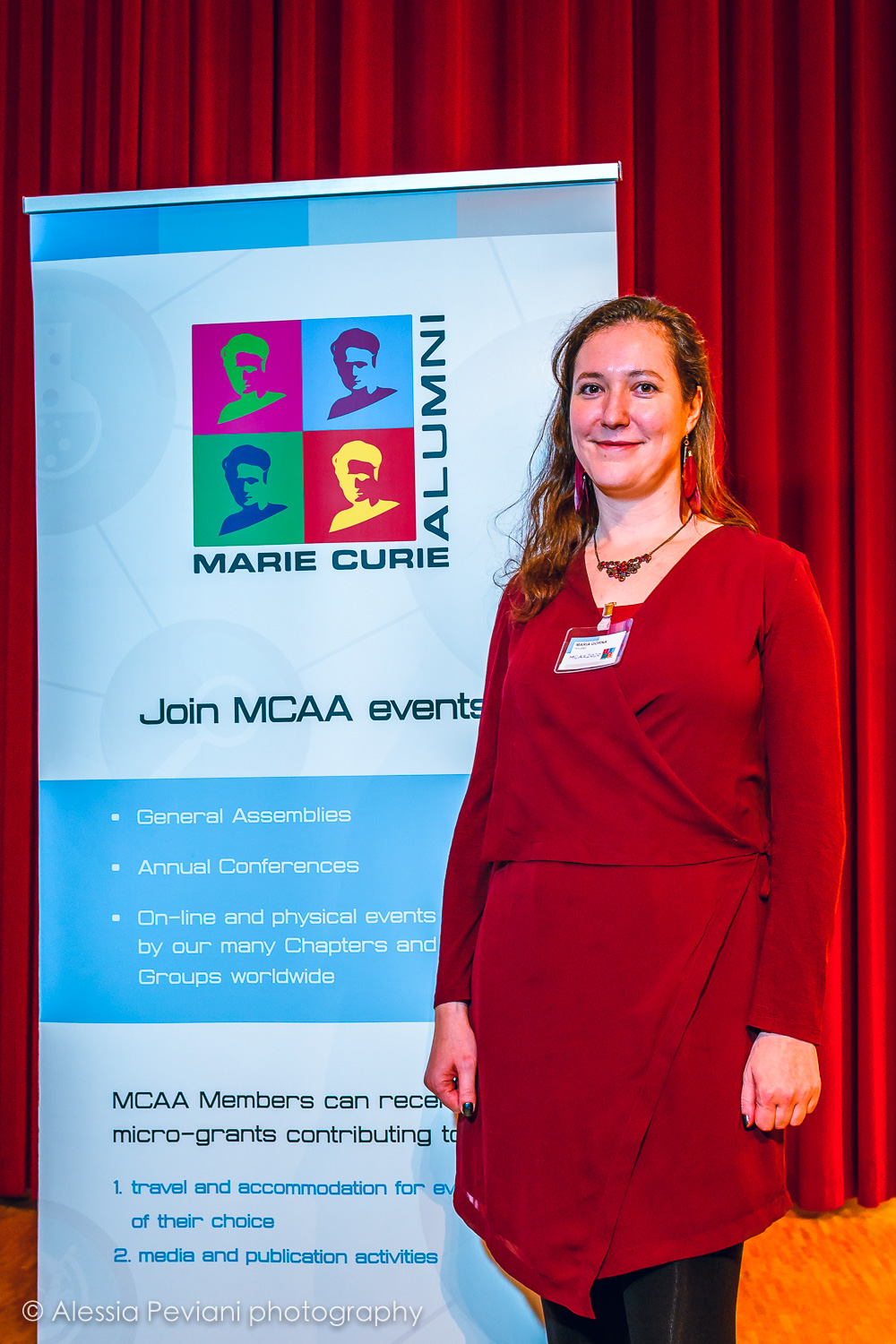
Could you say a few words about yourself?
I am a biochemist and a structural biologist – I studied in Poland, then did my PhD as a Marie Curie Early Stage Researcher at the University of Cambridge. After 5 years as a postdoc at CeMM in Vienna, I returned to Poland in 2015 as a MSCA Individual Fellow and an EMBO Installation Grantee to start my own group. I am now a junior group leader in structural biology and I lead several basic research and R&D projects related to biotechnology. I also founded the MCAA Polish Chapter last year.
Why did you apply for the position of Ordinary Board Member?
I have really enjoyed working for the MCAA community so far — I formed a Chapter and have been attracting members, organising workshops and events. For example, we co-organised the ‘Bridging Science and Business’ and ‘Standing up for Science EU’ workshops, as well as the celebrations for Marie Skłodowska-Curie’s 150th birthday in Poland. I have met fantastic and engaged people at the MCAA and I am always delighted by the diverse mix of topics, career paths and nationalities. I am passionate about all things science-related, but mostly about people and matters important to researchers inside — or outside of — academia. All of this made me want to continue working for the MCAA and to join the excellent team that makes up the MCAA Board, where I feel I can contribute the most. Incidentally, it also feels fitting to have a Polish scientist called Maria on the Board, and I strive to honour the memory of our eponymous role model!
What are your priorities for the MCAA for the coming two years?
I am passionate about the career development of MCAA members and scientists in general, and this encompasses many different aspects. I would like to work on the visibility of the MSCA brand, to initiate and maintain key partnerships with other active organisations, and to create opportunities for continued skills development and networking. I would like to help ensure that we are an inclusive community, and in particular encourage women in science or business. Throughout my career, I have benefited from various leadership and management courses, secured generous funding, and started my own group. Now I have ideas on how to transfer knowledge gained elsewhere to improve the training of MCAA members.
I would like the MCAA to continue growing as a hub of activities, a hub in which every member can find something to support their career and interests.
Could you share your impressions from the General Assembly?
The General Assembly is the MCAA in a nutshell — it is home to all the different nationalities and inter-disciplinarity that we can be so proud of, on top of scientific excellence and enthusiastic engagement on a variety of topics important for society. The GA complements other more research-focused, specialised conferences enabling us to make unexpected connections with other fields or science-related activities. This GA was also a very special and emotional experience for me — I had never run in any elections before, and I was touched by the numerous votes, so I would like to thank all members for their show of support!

SPECIAL COVERAGE
Interview with Renaud Jolivet
ORDINARY BOARD MEMBER
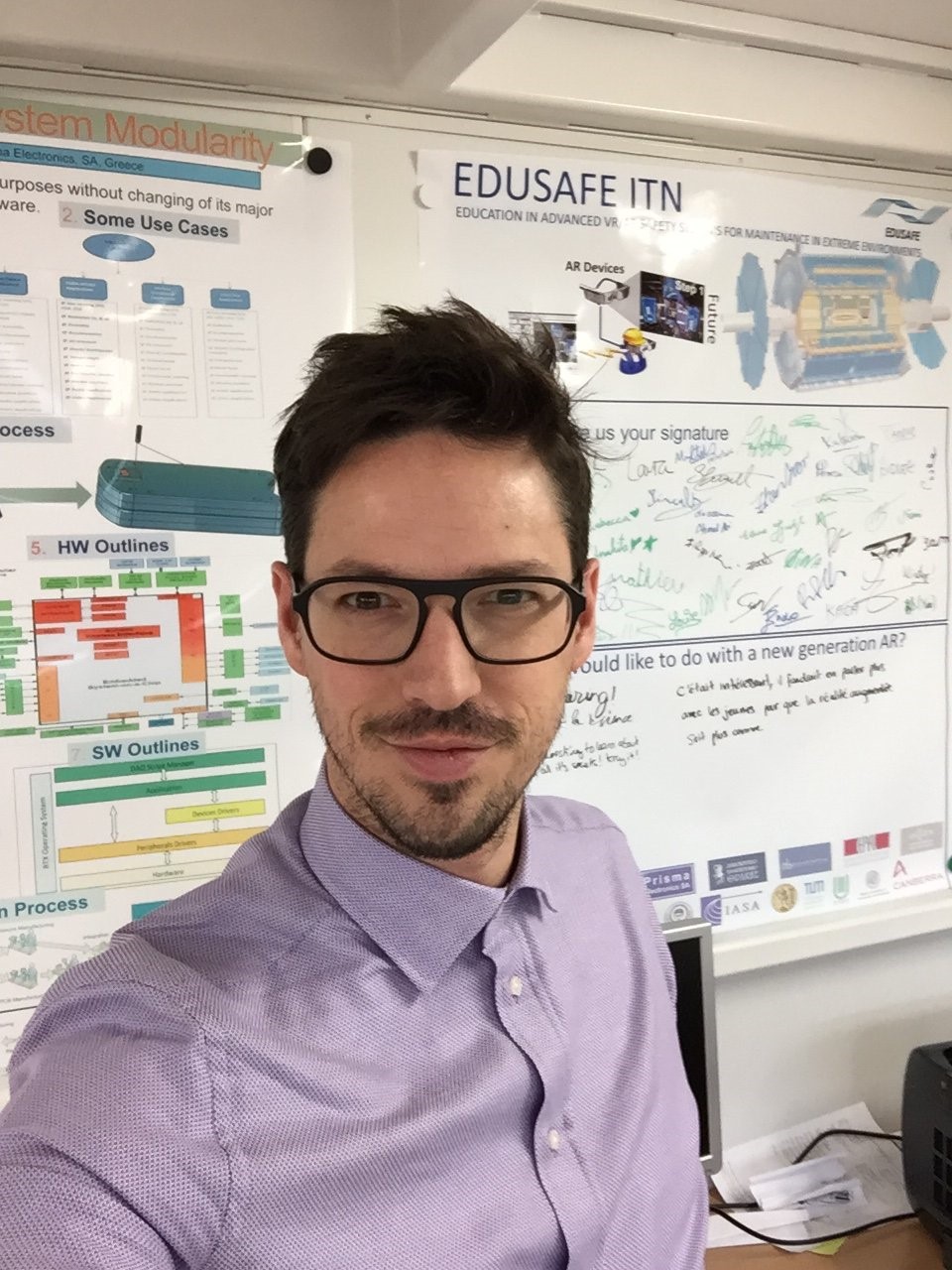
Could you say a few words about yourself?
I was born and raised in Switzerland, although I also hold French citizenship. I did my undergrad in physics, after which I switched to neuroscience. I did my PhD at EPFL in Lausanne, had a brief career interruption, and then went on to be a postdoc in Lausanne and Zürich with short stints in Japan. After that, I moved to London for five years and this is where I did my Marie Curie Individual Fellowship. In January 2016, I returned to Switzerland to start my own lab in medical physics between CERN and the University of Geneva. I now lead a team of five PhD students and postdocs. My main academic interests are brain energy and non-neuronal cells, which I investigate using a combination of computational modelling and cellular neuroscience experiments.
Why did you apply for an Ordinary Board Member position?
My Individual Fellowship allowed me to spend a significant amount of time abroad and these were transformative years. As such, I have benefited hugely from the MSCA programme professionally, but also for my personal development. I have also always had an interest in policy. Being a Board Member allows me to give back through volunteering and having the possibility to shape a small bit of the future of Europe during what appears to be a transition period in modern history. I also hope to gain some valuable experience I can use later in other contexts in my career.
What are your priorities for the MCAA for the next coming two years?
I have been involved in the MCAA mentoring program (MCAA Academy) since its inception and I am really keen on developing this project as I believe that mentoring is too often missing in academia. We have a vast repertoire of skills, positions and experience within our members which could be very effectively tapped into to help young, or more senior, members of our association. This is going to be my personal priority. Separately from that, I believe that we need to take active steps to grow the association and I am keen on exploring new ways to sustain the association financially.
Could you share your impressions from the General Assembly??
Even though I have been an active member since 2013, I had never attended a GA before. I was very impressed by the number of participants, the level of engagement of our members and the diversity of activities our members participate in. For me this was a very positive experience. I am now looking to participating to the next two GAs during my tenure in the Board.
SPECIAL COVERAGE
Interview with Nehama Lewis
ORDINARY BOARD MEMBER
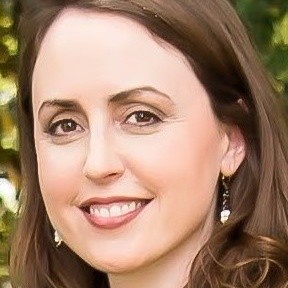
Could you say a few words about yourself?
Hi, my name is Nehama Lewis, and I am Australian with dual Israeli citizenship. Following my doctoral studies in communication (University of Pennsylvania, 2010) and postdoctoral research in psychology (Florida International University, 2010-2012), I was privileged to receive a Marie Curie Career Reintegration Grant. The grant (CIG- 333605, 2013-2017) was for investigating the ways in which young adults in Israel and the US engage with information about drugs from media and interpersonal sources (https://cordis.europa.eu/result/ rcn/208746_en.html). In addition, we tested a longitudinal model of the effects of information-seeking on drug use behaviour. The results show that drug-related information-seeking may be an early indicator of greater risk of use. Besides my involvement in the MCAA, I am a tenured faculty member at the University of Haifa (website and CV), and serve as head of the MA programmes in strategic communication and public relations. My research focuses on the role of the media in shaping human behaviour and draws from communication and psychology (persuasion). I am particularly interested in studying the effects of media (including campaign messages) on health behaviours, such as cancer screening, as well as risk behaviours, such as substance use.
Why did you apply for the position of Ordinary Board Member?
I was a founding member of the Israeli MCAA chapter and chapter chair since 2015. Since 2015, I have also taken part in the MCAA GA and in board meetings in an ex-official capacity. When the opportunity arose to contribute from my area of expertise to the MCAA board, I was happy to offer my candidacy. The MCAA is a unique organisation that encompasses academic researchers and scientists working in the non-academic sector from a diversity of fields and backgrounds. I am confident that the new board will help the organisation continue to develop and to serve its members, and am happy to play a role in this process as Ordinary Board Member.
What are your priorities for the MCAA for the coming two years?
Strategic communication between the MCAA and related organisations is a key factor in the MCAA’s continued growth and success. The organisation has made great progress in its outreach efforts during the last few years. My priority is to contribute to these efforts by applying my knowledge in strategic communication. Specifically, I aim to identify, implement and evaluate effective communication strategies. These strategies will be used within the MCAA, to facilitate effective communication across working groups and chapters, as well as enhance the MCAA’s outreach activities and collaborations with other scientific and professional organisations.
Could you share your impressions from the General Assembly?
The General Assembly (GA) in Leuven was very successful, and provided participants with an interesting range of sessions, social events, workshops and networking opportunities. I attended the GA in Salamanca (2017) and in Venice (2016) and always feel very much at home. The GA provides a unique forum for meeting researchers from around the world, discussing diverse scientific issues and interests, and learning about different career paths and opportunities. I look forward to next year’s GA in Vienna, and am sure it will be as productive and enjoyable as in previous years.

SPECIAL COVERAGE
Interview with Marco Masia
ORDINARY BOARD MEMBER
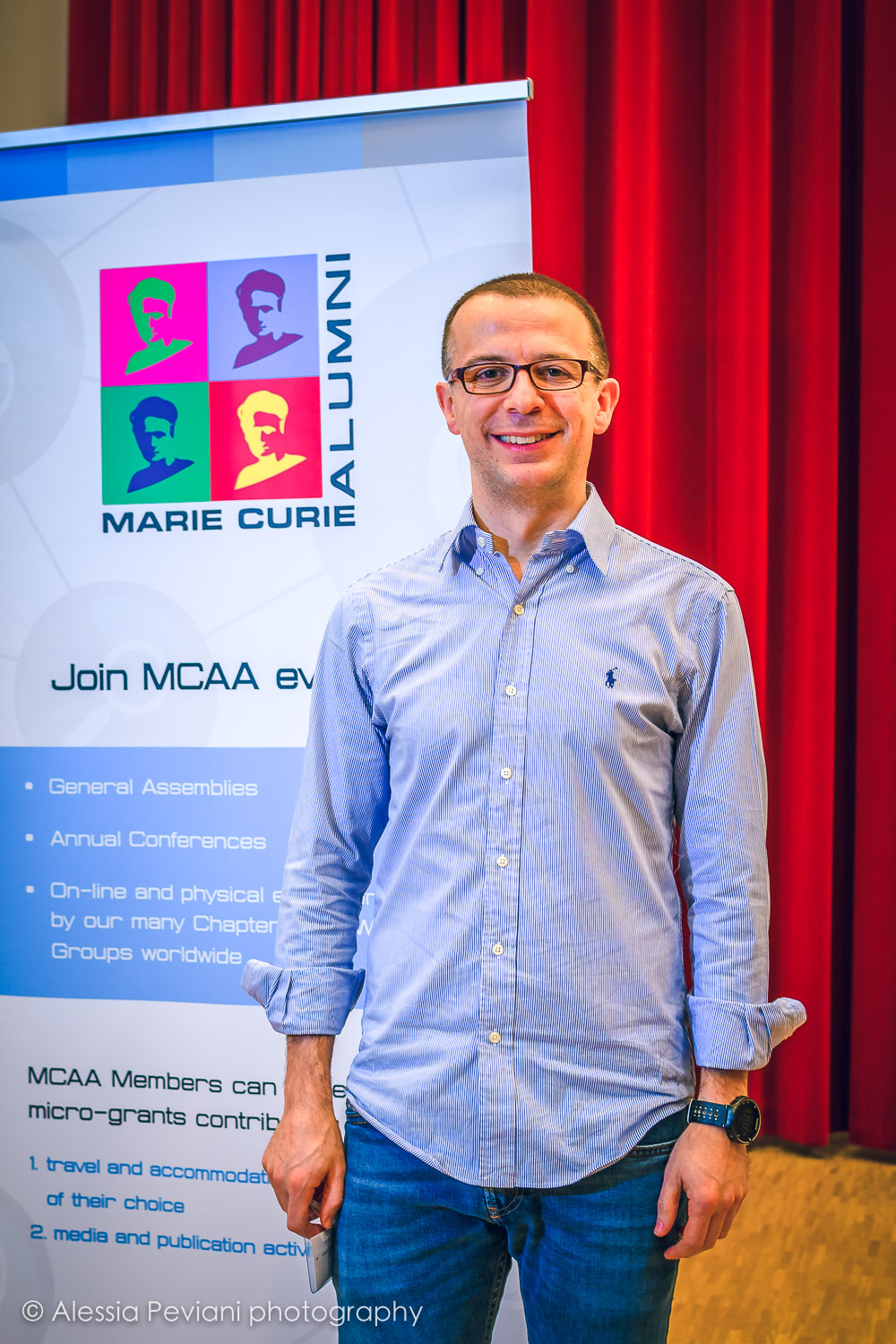
Could you say a few words about yourself?
I am Italian, currently living in Germany with my wife and three children. After working in academia for 10 years as Assistant Professor of Theoretical Chemistry at the University of Sassari [http://physchem.uniss.it/marco.masia], I turned to entrepreneurship. I currently advise start-ups and businesses as an Innovation Manager and I also train and coach researchers on innovation and entrepreneurship.
Why did you apply for the position of Ordinary Board Member (after two years as the Vice-Chair)?
With my fellow members on the previous Board, we laid the foundations for the organisation’s growth. Over the past two years, we have made important connections with institutions and companies. We have also developed the IT infrastructure of the MCAA, improved internal organisation and initiated many important projects, such fundraising (the book on Marie Curie being the most successful). With collaboration between chapters, working groups and individual members, we have also rolled out the mentoring initiative, online training courses (mostly provided by Epigeum), and webinar series on policy and business that can be followed on our YouTube channel. We have also created a blog and have organised many local gatherings and events. Since I took an active role in many of these initiatives, I decided to apply to be an Ordinary Board Member to follow them more closely. I was tempted to run for chair, but I thought that the executive committee needed fresh blood and enthusiasm. I am very happy about the election results. All the people on the board are very motivated and make a great team. Our Excom members offer supplementary expertise and will work well together.
What are your priorities for the MCAA for the coming two years?
I think that the first priority is to develop the association as a more independent entity, where members take greater responsibility for its growth and success. This means encouraging members to get more engaged in the life of the Association. The GA in Leuven was a great catalyst for engagement: many working groups and chapters have developed new ideas and activities thanks to the willingness of members to step in and help carry out many initiatives. The new Board will make sure that chapter and working group chairs are empowered and motivated, and it will coordinate and support many initiatives. The most important tasks for the new Board are to develop a sustainable long-term fundraising strategy, to devise standard operating procedures so that the association functions better and to improve communication with members and partners.
Could you share your impressions from the General Assembly?
I think that the strongest impression I had was of the enthusiasm of the members. Despite a few organisational glitches (something we will address for the next year), people were keen to get involved, to meet other members, and to find out about our ongoing and future initiatives. I could see that people really enjoyed the GA, and look forward to a great GA next year.

SPECIAL COVERAGE
Interview with Sara Riccardo
ORDINARY BOARD MEMBER
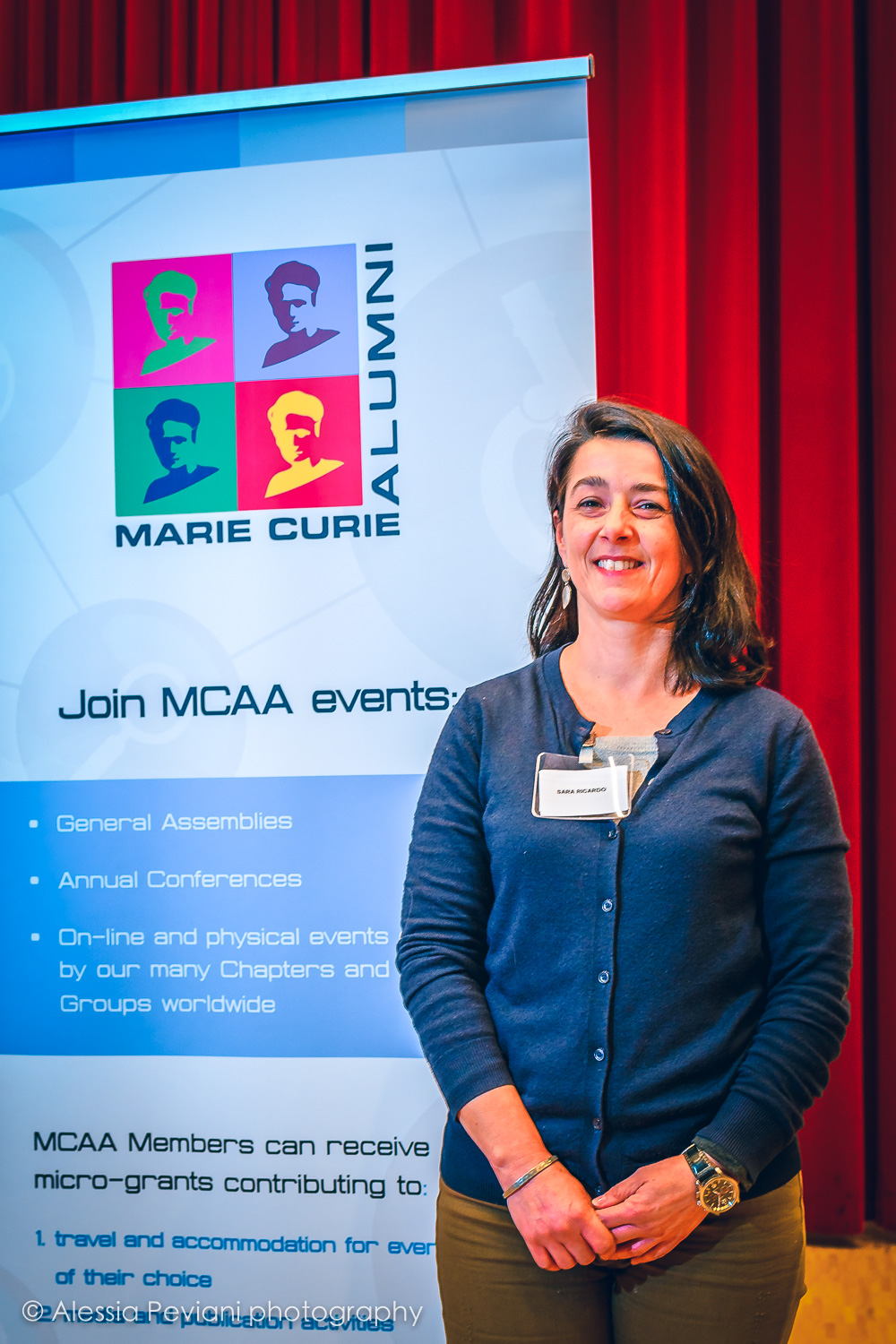
Could you say a few words about yourself?
I am a scientist in the Life Sciences with an interest in helping to make science fairer and more transparent, and helping it to have a positive impact on people’s lives. A little about my background: after finishing my degree in biology in Lisbon I moved to London where I obtained my PhD in Developmental Biology at the NIMR/ UCL. I then moved to the Skirball Institute/ NYU Medical Centre, to conduct research on the mechanisms of cell migration and lipid signalling in the germline. In 2011 I moved to Barcelona with a Career Track Fellowship to establish my research on the principles of global single cell population behaviour, and on the cell biology of germ cells during development. I received my MSCA grant (a Career Integration Grant) at this time, which together with two other national project grants, was instrumental in developing the research. I joined the MCAA in 2014, joining the board of the Spain-Portugal Chapter in January 2016 and becoming an active member of the Policy Working group in April 2017. In March 2017, I also co-founded a scientific editing and consultance service.
Why did you apply for the position of Ordinary Board Member?
The MCAA has grown very much over the last year, both in terms of membership as well as the services and benefits offered to members. Because of this, it has also experienced increased visibility and is developing a reputation outside of the membership. My main motivation to apply was to allow the continuation of the good work developed by the former board and to build on this momentum to continue to deliver benefits to MCAA members. Within the scientific system, I would also like to give a voice to researchers.
What are your priorities for the MCAA for the coming two years?
Over the coming two years, we will work as a team to: improve operational efficiency; to involve our membership even more; to connect and collaborate with external partners to increase researchers’ benefits, and to function as a representative of researchers in policy discussions.
Could you share your impressions from the General Assembly?
I think the General Assembly went well. We had good dynamic workshops and sessions that saw involvement by members and a great deal of
interest. There are also some interesting projects being developed in the different working groups. We hope that the General Assembly next year in Vienna will be an even greater success.